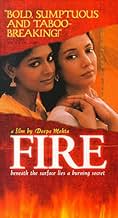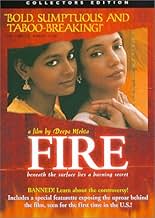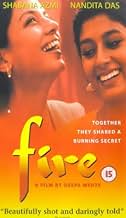IMDb-BEWERTUNG
7,1/10
6580
IHRE BEWERTUNG
Füge eine Handlung in deiner Sprache hinzuTwo women who are abandoned by their husbands find love and solace in each other.Two women who are abandoned by their husbands find love and solace in each other.Two women who are abandoned by their husbands find love and solace in each other.
- Auszeichnungen
- 7 Gewinne & 1 Nominierung insgesamt
Jaaved Jaaferi
- Jatin
- (as Javed Jaffrey)
Devyani Saltzman
- Girl in video shop
- (as Devyani Mehta Saltzman)
Empfohlene Bewertungen
This intelligent, moving and beautiful film is a study in the ways people react to tradition (reminds me of William Faulkner's novels).
The characters all feel trapped by the weight of the roles they are expected to assume, and seek for a way to live within those roles rather than throw them off altogether. But as the story develops the two wives, trapped in loveless marriages, draw together. Drawing on the strength of their friendship and love, they give each other the courage to abandon their roles.
They have found that living within their traditions is no life at all, it is a sort of living death: without passion, without true connection to others, without fulfillment. Although they know there will be a price to be paid for their rebellion and freedom, it is a price much less dear than the sacrifice called for by a comfortable, predictable existence.
The screenplay is wonderful, the acting marvelous. Near perfect!
The characters all feel trapped by the weight of the roles they are expected to assume, and seek for a way to live within those roles rather than throw them off altogether. But as the story develops the two wives, trapped in loveless marriages, draw together. Drawing on the strength of their friendship and love, they give each other the courage to abandon their roles.
They have found that living within their traditions is no life at all, it is a sort of living death: without passion, without true connection to others, without fulfillment. Although they know there will be a price to be paid for their rebellion and freedom, it is a price much less dear than the sacrifice called for by a comfortable, predictable existence.
The screenplay is wonderful, the acting marvelous. Near perfect!
A fairly interesting look at some characters from India's burgeoning middle class. Although India is rapidly modernizing, her culture is not keeping up. This film involves the patriarchal society, where women are not yet truly free citizens. A land of arranged marriages, men who dally with mistresses with total impunity, and women who are expected to tolerate all this, will eventually come up short. I was impressed with Nandita Das, who was quite attractive, and played her character with total earnestness. But I was even more impressed with Shabana Azmi, who I understand is a long-time fixture of Bollywood. Her quiet beauty and low-key psychic suffering was excellent. The lesbian subtext of this film was never particularly erotic, and never titillating. (Darn!) Worth a look for those interested in vastly different cultures.
In the contemporary India, Jatin (Jaaved Jaaferi) is a man in love with the Chinese Julie (Alice Poon), who does not want to get married and become a housewife, since she intends to move to Hong Kong and become an actress. Due to the pressure of his family asking for a baby, Jatin decides to get married with the virgin Sita (Nandita Das) in a arranged marriage. Sita moves to the house of Jatin's family, where live on the second floor the matriarch Biji (Kushal Rekhi), the servant Mundu (Ranjit Chowdhry) and the unfertile Radha (Shabana Azmi) and her husband Ashok (Kulbhushan Kharbanda). On the first floor, they run a small business of video rental and food. Ashok opted for the celibate, since in his opinion, sex would be only for procreation and never for lust or desire. Both women are neglected by their husbands, and their loneliness turns into a lesbian relationship. I do not know much about Indian society, but I found this movie a sensitive and delicate love story of two needy women, born and raised in a repressive and male society. The story is never vulgar or erotic, and it is very easy to understand their attraction. The beauty of Nandita Das is very impressive. The direction and the performance of the cast is outstanding. Another excellent example of the Indian cinema. My vote is eight.
Title (Brazil): 'Fogo e Desejo' ('Fire and Desire')
Title (Brazil): 'Fogo e Desejo' ('Fire and Desire')
Bold, controversial and taboo-breaking are among the many attention-grabbing words that have been used to describe 'Fire' and this has no doubt helped the film gain recognition. However, I feel that such adjectives undermine the true beauty of that is depicted in this picture. It deals with many themes such as feminism, affection, love and freedom and at the heart of the film lies the relationship between Seeta and Radha. The bond between them is portrayed with such innocence, tenderness, affection and sensibility that its beauty stands out. The growth in the two characters and the development of their relationship is splendid to watch. While the relationship is portrayed with sensuality, there is no titillation or overt skin exposure.
Due to the theme of homosexuality and the questioning of religion, 'Fire' was ridiculously banned in several countries. It is never specified whether Seeta or Radha were exclusively homosexual. They're never shown to not enjoy a sexual relationship with their respective male partners. Radha has made numerous attempts over the years to have that kind of intimacy with her celibate husband but he's the one who refuses while in Seeta's case, sex is a mechanical thing for her husband. What they Seeta and Radha find in each other is affection, love, desire and tenderness, something they yearned for but never had with their husbands.
Many have argued that Deepa Mehta deliberately uses shock value and portrays India as repressed in order to make her film appeal to the Western audience. I don't know whether that was her intention with 'Fire' but to me it felt like an honest movie and the problems portrayed in this film are still very much a reality in India. I would even go as far to say that this is among Mehta's best works. Her use of metaphors is brave and gives the film a poetic feel.
Mehta's films have often scored high in the technical department and 'Fire' is no different. Here the cinematography and A.R. Rahman's score particularly stand out. The music is mesmerizing. The art direction too is brilliant.
Luminous Nandita Das is terrific as the young, vivacious and energetic Seeta. Shabana Azmi is once again transcendent. Her nuanced, quiet and restrained performance easily touch on the heartstrings. Kulbhushan Kharbanda and Javed Jaffrey provide good support.
Forget all the labelling, controversial or not 'Fire' is worth seeing for the beauty it portrays when two people find love and freedom in each other.
Due to the theme of homosexuality and the questioning of religion, 'Fire' was ridiculously banned in several countries. It is never specified whether Seeta or Radha were exclusively homosexual. They're never shown to not enjoy a sexual relationship with their respective male partners. Radha has made numerous attempts over the years to have that kind of intimacy with her celibate husband but he's the one who refuses while in Seeta's case, sex is a mechanical thing for her husband. What they Seeta and Radha find in each other is affection, love, desire and tenderness, something they yearned for but never had with their husbands.
Many have argued that Deepa Mehta deliberately uses shock value and portrays India as repressed in order to make her film appeal to the Western audience. I don't know whether that was her intention with 'Fire' but to me it felt like an honest movie and the problems portrayed in this film are still very much a reality in India. I would even go as far to say that this is among Mehta's best works. Her use of metaphors is brave and gives the film a poetic feel.
Mehta's films have often scored high in the technical department and 'Fire' is no different. Here the cinematography and A.R. Rahman's score particularly stand out. The music is mesmerizing. The art direction too is brilliant.
Luminous Nandita Das is terrific as the young, vivacious and energetic Seeta. Shabana Azmi is once again transcendent. Her nuanced, quiet and restrained performance easily touch on the heartstrings. Kulbhushan Kharbanda and Javed Jaffrey provide good support.
Forget all the labelling, controversial or not 'Fire' is worth seeing for the beauty it portrays when two people find love and freedom in each other.
Even if you normally don't watch these types of movies you will be glad you didn't miss this one! Gain a hockingly real look into the lives of these two woman as they face some of the toughest of life's obstacles.
If you enjoy this film see also Water another film in this series.
WUSSTEST DU SCHON:
- WissenswertesDeepa Mehta after being inspired by Nandita Das in the film.She signed her for Earth 1947.(1999).
- VerbindungenFeatured in The Movie Show: Folge vom 13. August 1997 (1997)
- SoundtracksBombay Theme
(1995)
Composed by A.R. Rahman
From the Bombay (1995) soundtrack
Available on CD & cassette from PolyGram India Ltd.
Courtesy of Mani Ratnam
Top-Auswahl
Melde dich zum Bewerten an und greife auf die Watchlist für personalisierte Empfehlungen zu.
- How long is Fire?Powered by Alexa
Details
Box Office
- Bruttoertrag in den USA und Kanada
- 402.749 $
- Eröffnungswochenende in den USA und in Kanada
- 14.384 $
- 24. Aug. 1997
- Laufzeit1 Stunde 48 Minuten
- Farbe
- Sound-Mix
Zu dieser Seite beitragen
Bearbeitung vorschlagen oder fehlenden Inhalt hinzufügen

Oberste Lücke
What is the Spanish language plot outline for Fire - Wenn die Liebe Feuer fängt (1996)?
Antwort





























